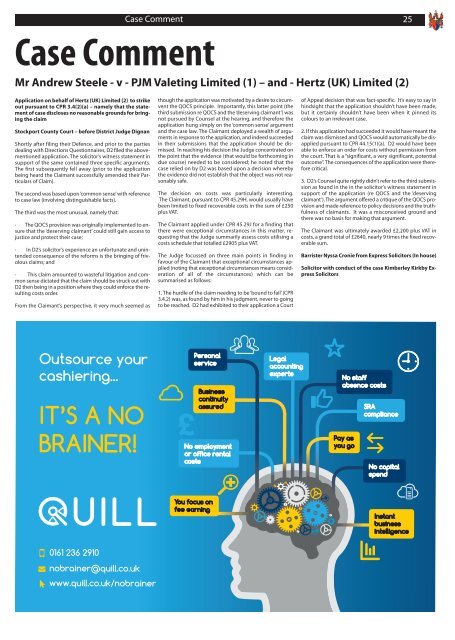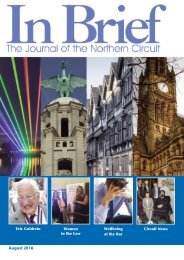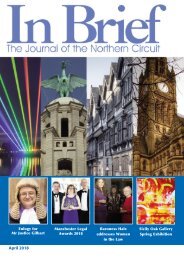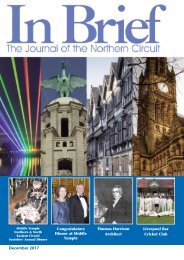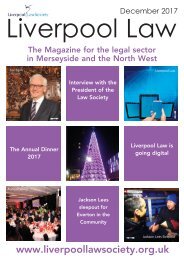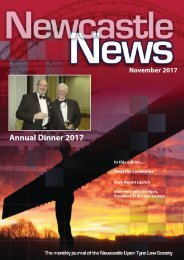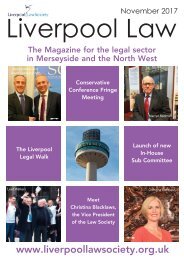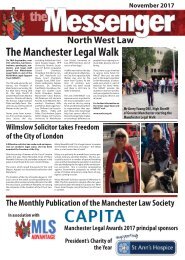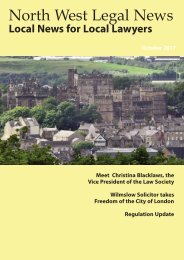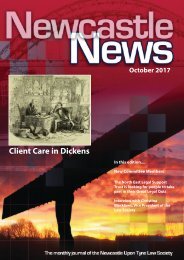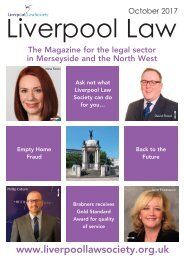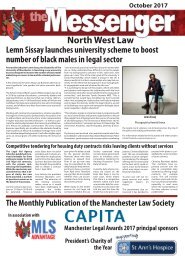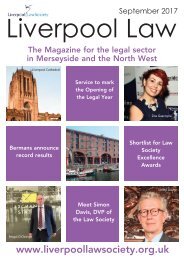Messenger December 2017
You also want an ePaper? Increase the reach of your titles
YUMPU automatically turns print PDFs into web optimized ePapers that Google loves.
Case Comment 25<br />
Case Comment<br />
Mr Andrew Steele - v - PJM Valeting Limited (1) – and - Hertz (UK) Limited (2)<br />
Application on behalf of Hertz (UK) Limited (2) to strike<br />
out pursuant to CPR 3.4(2)(a) – namely that the statement<br />
of case discloses no reasonable grounds for bringing<br />
the claim<br />
Stockport County Court – before District Judge Dignan<br />
Shortly after filing their Defence, and prior to the parties<br />
dealing with Directions Questionnaires, D2 filed the abovementioned<br />
application. The solicitor’s witness statement in<br />
support of the same contained three specific arguments.<br />
The first subsequently fell away (prior to the application<br />
being heard the Claimant successfully amended their Particulars<br />
of Claim).<br />
The second was based upon ‘common sense’ with reference<br />
to case law (involving distinguishable facts).<br />
The third was the most unusual, namely that:<br />
· The QOCS provision was originally implemented to ensure<br />
that the ‘deserving claimant’ could still gain access to<br />
justice and protect their case;<br />
· In D2’s solicitor’s experience an unfortunate and unintended<br />
consequence of the reforms is the bringing of frivolous<br />
claims; and<br />
· This claim amounted to wasteful litigation and common<br />
sense dictated that the claim should be struck out with<br />
D2 then being in a position where they could enforce the resulting<br />
costs order.<br />
From the Claimant’s perspective, it very much seemed as<br />
though the application was motivated by a desire to circumvent<br />
the QOCS principle. Importantly, this latter point (the<br />
third submission re QOCS and the ‘deserving claimant’) was<br />
not pursued by Counsel at the hearing, and therefore the<br />
application hung simply on the ‘common sense’ argument<br />
and the case law. The Claimant deployed a wealth of arguments<br />
in response to the application, and indeed succeeded<br />
in their submissions that the application should be dismissed.<br />
In reaching his decision the Judge concentrated on<br />
the point that the evidence (that would be forthcoming in<br />
due course) needed to be considered; he noted that the<br />
case relied on by D2 was based upon a decision whereby<br />
the evidence did not establish that the object was not reasonably<br />
safe.<br />
The decision on costs was particularly interesting.<br />
The Claimant, pursuant to CPR 45.29H, would usually have<br />
been limited to fixed recoverable costs in the sum of £250<br />
plus VAT.<br />
The Claimant applied under CPR 45.29J for a finding that<br />
there were exceptional circumstances in this matter, requesting<br />
that the Judge summarily assess costs utilising a<br />
costs schedule that totalled £2905 plus VAT.<br />
The Judge focussed on three main points in finding in<br />
favour of the Claimant that exceptional circumstances applied<br />
(noting that exceptional circumstances means consideration<br />
of all of the circumstances) which can be<br />
summarised as follows:<br />
1. The hurdle of the claim needing to be ‘bound to fail’ (CPR<br />
3.4.2) was, as found by him in his judgment, never to going<br />
to be reached. D2 had exhibited to their application a Court<br />
of Appeal decision that was fact-specific. It’s easy to say in<br />
hindsight that the application shouldn’t have been made,<br />
but it certainly shouldn’t have been when it pinned its<br />
colours to an irrelevant case.<br />
2. If this application had succeeded it would have meant the<br />
claim was dismissed and QOCS would automatically be disapplied<br />
pursuant to CPR 44.15(1)(a). D2 would have been<br />
able to enforce an order for costs without permission from<br />
the court. That is a “significant, a very significant, potential<br />
outcome”. The consequences of the application were therefore<br />
critical.<br />
3. D2’s Counsel quite rightly didn’t refer to the third submission<br />
as found in the in the solicitor’s witness statement in<br />
support of the application (re QOCS and the ‘deserving<br />
claimant’). The argument offered a critique of the QOCS provision<br />
and made reference to policy decisions and the truthfulness<br />
of claimants. It was a misconceived ground and<br />
there was no basis for making that argument.<br />
The Claimant was ultimately awarded £2,200 plus VAT in<br />
costs, a grand total of £2640, nearly 9 times the fixed recoverable<br />
sum.<br />
Barrister Nyssa Cronie from Express Solicitors (In house)<br />
Solicitor with conduct of the case Kimberley Kirkby Express<br />
Solicitors


